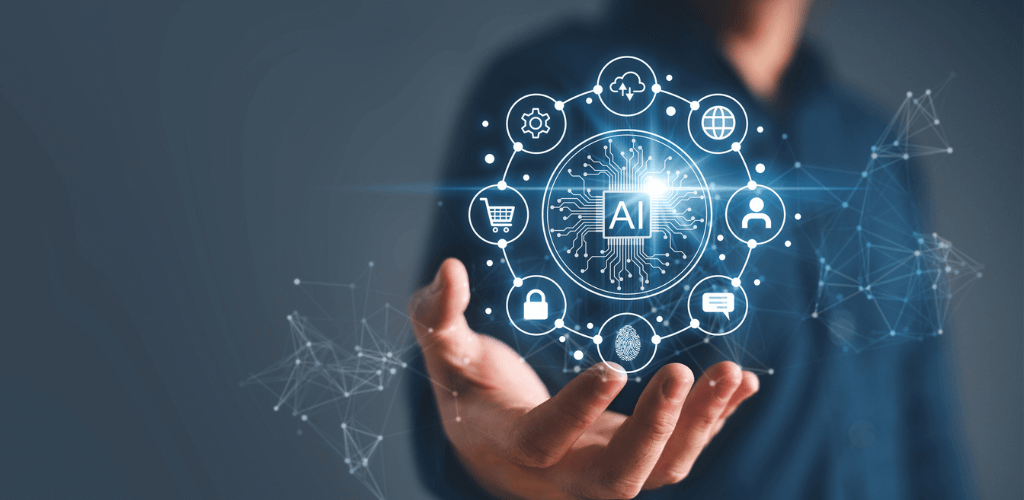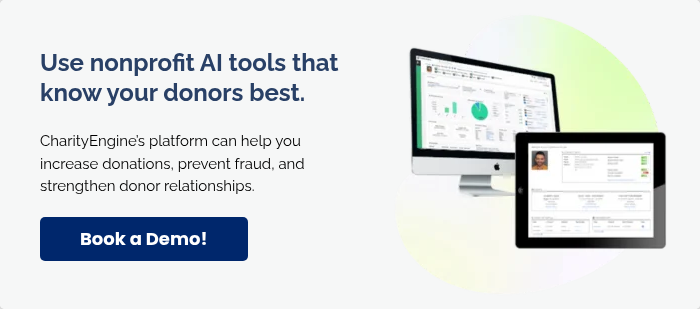
Artificial intelligence (AI) is dominating headlines—and nonprofits are paying attention. 82% of nonprofits are already using AI for everything from grant writing to prospect research. If your team hasn’t hopped on board, now’s the time!
Curious about how to get on board with nonprofit AI (or why it even matters)? You’ve come to the right place! In this guide, we’ll cover:
- What Is Nonprofit AI?
- How To Embrace Nonprofit AI At Your Organization
- Top 5 Nonprofit AI Tools Your Organization Can Use
What Is Nonprofit AI?
AI-powered software processes vast amounts of data, rapidly refines answers to queries, and automates much of the work that traditional software delegates to manual effort. Our friend Mike Kaput with Marketing AI Institute puts it this way: “AI is the science of making software smarter.”
Nonprofit AI, then, refers to the application of AI software to nonprofit workflows. These use cases include:
- Predicting donor retention rates (and churn)
- Forecasting website traffic and online engagement
- Projecting program enrollment and participation
- Detecting emotion and engagement in videos
- Editing and enhancing images and video automatically
- Extracting promotional clips from videos
- Summarizing annual reports and research papers
- Transcribing audio and video, then extracting insights
- Responding to donor questions through chatbots
- Estimating the impact of promotional or marketing campaigns
The important thing to note about nonprofit AI is its existing prevalence. We’re not talking about the high-tech future of fundraising, but technology that’s already here.
If you haven’t been introduced to AI’s basic functionalities yet, there are three different categories you should know.
Predictive AI
Predictive AI forecasts information based on the analysis of existing data. This technology can also recommend actions, such as donor outreach tactics or personalization efforts, informed by the data you feed it.
You may have already seen this feature in Gmail’s Smart Reply offering:

Gmail’s software analyzes the content of an email message, predicts the possible responses, and suggests the recipient’s next actions with easy-to-click buttons.
Generative AI
Generative AI is technology that uses machine learning to produce original content. The types of content it generates may vary (especially depending on the platform you use), but can include text, audio, images, and even video.
Let’s look at an example. We asked Google’s Gemini to create an image of a dog for a flyer advertising an animal shelter’s annual fundraising event. Here’s what it generated:

While the prompt was human-generated, the image wasn’t—and it took merely seconds to create.
Large Language Models
Large language models (LLMs) can summarize information and output recommendations accordingly. Popular examples you might know include OpenAI’s ChatGPT and Google Gemini. Here’s what these tools can do:
- Read and write content
- Listen to audio
- Understand sentiment
- Recognize voices
- Translate languages
How To Embrace Nonprofit AI At Your Organization
Here are five common ways nonprofits can leverage AI in their existing operations.
1. Personalize Donor Communications
It’s not just personalizing communications; it’s personalizing communications at scale. Because donor relationships are foundational to successful fundraising, connecting with every single donor (not just the big givers) is critical.
AI can help nonprofits:
- Analyze donor data so you understand preferences and behaviors
- Tailor communications based on these insights
- Automate the delivery of personalized messages at the right time
AI can analyze massive amounts of data and uncover trends and patterns the human eye might not see. It can quickly segment donors based on these insights, grouping people by demographics, giving history, engagement levels, and interests. Then, generative models can write tailored emails and fundraising appeals.
Now, if you don’t have access to AI in your CRM, you can certainly do all of this manually or perhaps through some functionality in your software. AI can do it better, faster, more thoroughly, and for an unlimited amount of data, but the key donor engagement tenets of segmentation and personalization hold true for every nonprofit, even if your only tool is Excel.
2. Predict Donor Behavior
This strategy can be executed manually, but using the resources (time, energy, and staff) is unnecessary when technology can easily do the heavy lifting for you.
In a nutshell, we are talking about predicting donor behavior.
AI can predict:
- Which donors are likely to give
- When they are most likely to give
- How much they’re likely to give
- Which donors are at risk of lapsing
When you have this information readily available, you can easily pull a list of the prospects most likely to donate and have your team call them. If you have hundreds of donors ready to give, you can send an email instead of calling.
3. Identify Potential Major Donors
Most nonprofits have a team looking for major gift donors. Their job is to identify, nurture, and move them through the donor journey to the status of major gift donor.
The wealth data we just mentioned is one of many data points that can combine with AI to identify these elite donors. Looking at the following markers can inform the technology enough for major donor prospects to surface:
- Giving history
- Giving recency
- Giving frequency
- Demographics
- Education
- Job title
This, too, uses predictive analytics, but with a different focus. The systems will identify more granular data and more comprehensive data sets to show you precisely where to focus your efforts.
4. Optimize Your Fundraising Campaigns
We often talk about the value of real-time dashboards and extol the value of watching your campaign metrics in real time. That’s valuable, but let’s add AI to it so there’s a new layer of governance.
AI can monitor campaigns and identify channels when performance drops or surges. For example, if social posts drive more conversions than expected, AI tools can write additional posts and schedule publication on the appropriate channel at peak engagement.
When it comes to fundraising emails, scheduling a series of automated emails is a highly effective form of donor outreach.
5. Prevent Fraud
AI is a super-human fraud watchdog. It can detect and prevent fraudulent transactions faster and more accurately than ever before.
Whether it’s analyzing large volumes of financial data to spot abnormalities or unusual patterns, using real-time transaction monitoring to screen for suspicious activity, or simply doing these things around the clock, AI bolsters the integrity of your nonprofit’s reputation.
While AI can verify the authenticity of documents and detect subtle signs of forgery, it can also quickly cross-reference information to prove a transaction is valid. For example, this could include checking that a credit card perfectly matches the name on an account or that the correct zip code is entered on the donation form.
Top 5 Nonprofit AI Tools Your Organization Can Use
1. CharityEngine: Best for Fundraising AI
CharityEngine integrates AI directly into donor management and fundraising workflows. Our all-in-one CRM delivers robust donor data, while our AI-powered tools derive actionable donor insights, personalized communication recommendations, and more from a single platform.
Here’s what our nonprofit AI can do:
- Predict gift probability. We blend extensive data, advanced algorithms, and AI to tell you how engaged a donor is, how likely they are to donate based on their history and wealth screening, and what the probability is of that donor making a gift today. That way, you know what time to ask, how to ask, and for how much.
- Automate workflows. Whether you’re sending personalized emails to a large audience or generating reports to track your fundraising success, our AI-powered tools streamline mundane tasks to save time for your team.
- Improve communications. Use our AI to hyperpersonalize donor communications, filling in past donation amounts and notes directly to each donor. CharityEngine’s email interface is integrated with ChatGPT, so if you type “Write a fundraising email to save the spotted leopards,” it will do just that. You review, edit, and send. It can even include relevant facts about the leopards, saving you time.
You can rest assured that your nonprofit’s data is completely safe within our secure, feature-rich platform. Our advanced fraud protection leverages AI to protect donor data and information. That way, you can make the most of AI technology without hesitation about its security.
Best of all? Our platform isn’t just AI-enabled fundraising or project management. With our comprehensive CRM, your nonprofit can handle everything from one unified platform.
2. ChatGPT: Best for Content Generation

ChatGPT is a chatbot that uses LLMs to facilitate human-like conversations with users. This means it can answer your nonprofit’s questions, including generating content and images when you ask it to. This makes ChatGPT perfect for:
- Drafting donor thank-you messages
- Optimizing email newsletter language
- Suggesting social media post captions
These capabilities allow you to create brand-consistent content in a fraction of the time. Just remember, it takes careful prompting to get the right responses from this AI tool. ChatGPT is trained on information that is publicly available on the internet, not your donor data. In other words, it won’t know how to accurately personalize messages to your organization’s unique audience, and your team shouldn’t rely solely on its outputs for donor-facing content.
3. Canva: Best for Graphic Design

Canva has long been a go-to graphic design tool, but the platform’s built-in AI features make it even easier to create professional-quality graphics for nonprofit campaigns and communications. This tool helps nonprofits create:
- Graphics for social media posts
- Visualizations for annual reports
- Branded donor communications
- Flyers, signage, and other decor designs for events
Also, Canva offers thousands of templates for various types of content. Even for team members who aren’t tech-savvy, this platform offers templates that anyone can adjust to match your nonprofit’s branding.
4. Buffer: Best for Social Media Automation

Beyond drafting Instagram captions or generating visual elements for your social media posts, your nonprofit might need a solution dedicated to social media management. Buffer is an AI-powered tool that helps you:
- Brainstorm content ideas
- Tailor your content to different platforms
- Schedule posts to automatically publish
Not to mention, Buffer’s tools collect engagement data to help you measure your social media success. With these insights, you can adjust the tone of your posts to increase engagement.
5. ClickUp Brain: Best for Project Management

The power of nonprofit AI extends far beyond content creation. As your nonprofit juggles marketing, fundraising, and even mission-related tasks, it’s important to have a tool that can manage the administrative work behind those projects. Enter ClickUp Brain.
This AI-powered solution streamlines project management, focusing on your organization’s internal processes. For example, it might summarize meeting notes or answer employee questions about your nonprofit’s PTO policy.
Next Step: Implementing Nonprofit AI
AI is here to stay. Remember when the internet first came on the scene and was considered a “fad” that would pass? We’ve learned our lesson! Educate yourself about AI and let it help you be a more effective fundraiser and leader. AI is, after all, the copilot you want flying next to you.
Now that you know what AI is, what it looks like, and how it can help your nonprofit, it’s time to start using it! The smartest path forward is to team up with a CRM vendor committed to keeping up with the latest technology trends and making sure their platform offers the most advanced, safest, most helpful tools.





-3.png)
%20(1024%20%C3%97%20500%20px)%20(8).png)